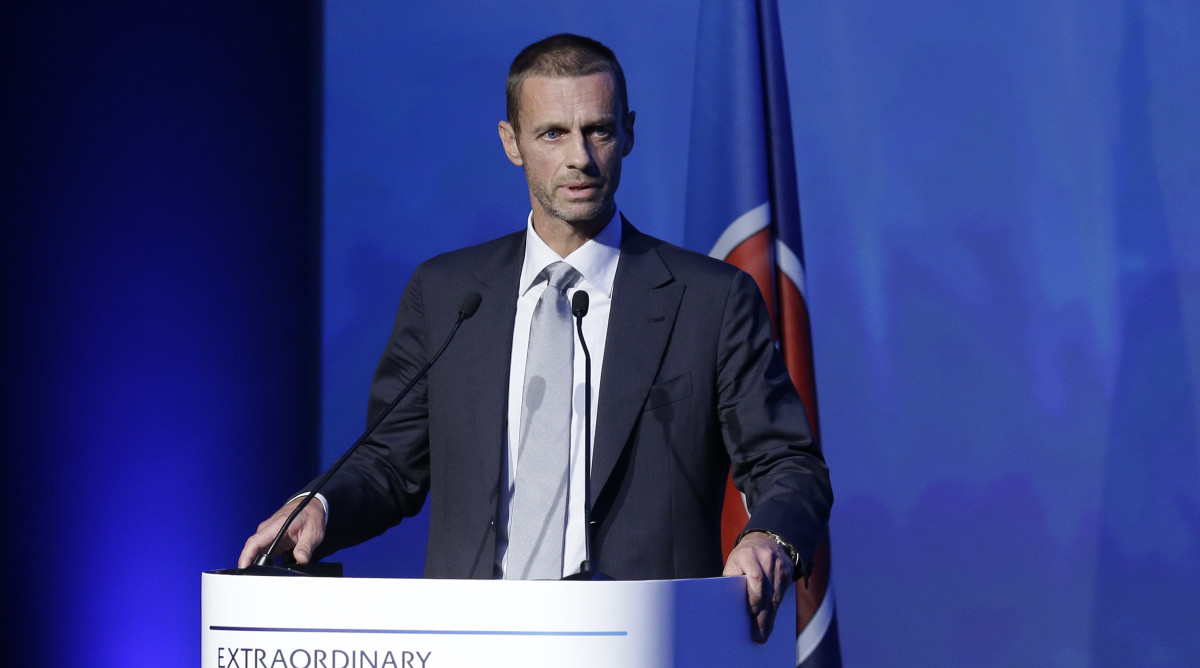Amid Coronavirus Chaos, a Plan Begins to Emerge for Soccer Around the Globe
Amid the chaos, there are the beginnings of some sort of plan for how global soccer can proceed. Everything, of course, remains subject to change, but after UEFA's video conference on Tuesday and concurrent meetings in South America, there is at least an outline of how football might go forward and when matches can be staged again after the coronavirus outbreak.
Euro 2020, as had been widely expected, has been postponed by a year to 2021, running from June 11 to July 11. That almost certainly means the women’s Euros, which had been scheduled for England in the summer of 2021 will be postponed by a year to the summer of 2022, when there is, happily, a space created by the decision to push the men’s World Cup in Qatar back to November-December. A final decision, though, will not be taken until the summer. The 2020 Copa América, scheduled to be held this summer in Argentina and Colombia, has also been pushed back by a year.
The Europa League and Champions League finals will also be delayed. UEFA says it has "a commitment to complete all domestic and European club competitions by the end of the current sporting season, i.e. 30 June 2020 at the latest, should the situation improve and resuming playing be appropriate and prudent enough," though it's clear the situation remains fluid. Its statement does, though, indicate UEFA's hope is that leagues can complete their seasons, allowing next season to begin at least roughly as scheduled, with the qualifying rounds for the 2020-2021 European competitions pushed slightly later. Whether any of that is possible depends largely on the success rate of the measures tackling the virus.
The decision was taken following a noon conference call (UK time) with UEFA's member associations, and although the Norwegian federation tweeted the outcome 17 minutes later, official confirmation didn’t come until shortly after 2 p.m., following further calls with the European Club Association, European Leagues and the international players’ union.
Two working groups have been established, one to work on the calendar and one to discuss the financial implications of the shutdown. It’s clear, though, that UEFA, fearful of the complications of seasons pursuing their own timetables, is keen, as much as possible, to preserve uniformity across the continent. An Italian proposal that the 2020-21 season should be cancelled or altered to give time to complete 2019-20 has so far been rejected.
Depending how long the crisis lasts, though, that may in time come to be the neatest solution, at least from a sporting point of view. What it means for broadcasting rights deals, sponsorship, player contracts and transfer windows is another question. But a truncated 2020-21 would allow everybody to take stock, would allow 2019-20 to be completed without the threat of legal action from sides relegated or missing out on promotion and would also permit ad hoc temporary competitions to be created, according to the needs of each individual country.

“We are at the helm of a sport that vast numbers of people live and breathe that has been laid low by this invisible and fast-moving opponent,” UEFA president Aleksander Ceferin said in a statement. “It is at times like these, that the football community needs to show responsibility, unity, solidarity and altruism.
“The health of fans, staff and players has to be our No. 1 priority and in that spirit, UEFA tabled a range of options so that competitions can finish this season safely and I am proud of the response of my colleagues across European football. There was a real spirit of co-operation, with everyone recognizing that they had to sacrifice something in order to achieve the best result.”
The real test of that spirit, though, will come if it becomes impossible to restart football in June and hard decisions have to be taken on cancelling rather than merely rearranging games.
The curious advantage of postponing the Euros for UEFA is that it strikes across the proposed revamped Club World Cup, which FIFA had intended to stage in China in the summer of 2021 with 24 teams. Negotiations for that were ongoing, but it’s hard to see now how that can possibly go ahead in 2021 without provoking a major rift with UEFA. FIFA is unlikely to wish to risk that given the obvious allegations that would follow of the greed of the major clubs being allowed to impinge on the continent’s national tournament. That CONMEBOL has followed UEFA's lead weakens FIFA's position in that regard even further, and FIFA has conceded that moving that competition to either later in 2021 or to 2022 or even 2023 is likely.
This is not, in any sense, a final plan, but it is at least a sensible start in laying out what can be done now and what a possible future may look like.
